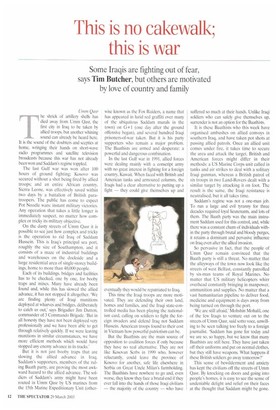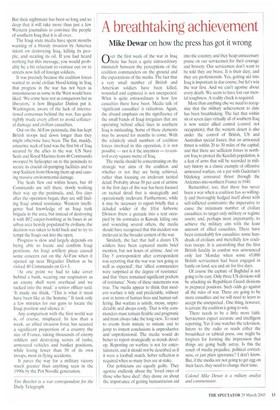This is no cakewalk; this is war
Some Iraqis are fighting out of fear, says Tim Butcher, but others are motivated by love of country and family Umm Qasr T, he shriek of artillery shells has died away from Umm Qasr, the first city in Iraq to be taken by allied troops, but another whining
sound can already be heard here. It is the sound of the doubters and sceptics at home, wringing their hands on short-wave radio programmes and satellite television broadcasts because this war has not already been won and Saddam's regime toppled.
The last Gulf war was won after 100 hours of ground fighting; Kosovo was secured without a shot being fired by allied troops; and an entire African country, Sierra Leone, was effectively saved within two days by a battalion of British paratroopers. The public has come to expect Pot Noodle wars: instant military victories. Any operation that takes a little longer is immediately suspect, no matter how complex or tricky its military objective.
On the dusty streets of Umm Qasr it is possible to see just how complex and tricky is the operation to rid Iraq of Saddam Hussein. This is Iraq's principal sea port, roughly the size of Southampton, and it consists of a maze of industrial buildings and warehouses on the dockside and a large residential area of single-storey buildings, home to more than 40,000 people.
Each of its buildings, bridges and facilities has to be checked, one by one, for booby traps and mines. Many have already been found and, while this has slowed the allied advance, it has not stopped it altogether. 'We are finding plenty of Iraqi munitions deployed at wharves and bridges, deliberately to catch us out,' says Brigadier Jim Dutton, commander of 3 Commando Brigade. 'But in all honesty they have not been deployed very professionally and we have been able to get through relatively quickly. If we were leaving munitions in similar circumstances, we have more efficient methods which would have stopped any enemy advance in its tracks.'
But it is not just booby traps that are slowing the allied advance in Iraq. Saddam's supporters, members of the ruling Baath party, are proving the most awkward hazard to the allied advance. The soldiers of Saddam's army might have been routed in Umm Qasr by US marines from the 15th Marine Expeditionary Unit (other
wise known as the Fox Raiders, a name that has appeared in lurid red graffiti over many of the ubiquitous Saddam murals in the town) on G+1 (one day after the ground offensive began), and several hundred Iraqi prisoners-of-war taken. But it is his party supporters who remain a major problem. The Baathists are armed and desperate: a powerful and dangerous combination.
In the last Gulf war in 1991, allied forces were dealing mainly with a conscript army with no great interest in fighting for a foreign country, Kuwait. When faced with British and American tanks and armoured columns, the Iraqis had a clear alternative to putting up a fight — they could give themselves up and eventually they would be repatriated to Iraq.
This time the Iraqi troops are more motivated. They are defending their own land, homes and families, and the Iraqi state-controlled media has been playing the nationalism card, calling on soldiers to fight the foreign invaders and defend Iraq not Saddam Hussein. American troops found to their cost in Vietnam how powerful patriotism can be.
But the Baathists are the main source of opposition to coalition forces if only because they have no real alternative. They are not like Kosovan Serbs in 1999 who, however reluctantly, could leave the province of Kosovo for another, safe life elsewhere in Serbia on Great Uncle Milan's farmholding. The Baathists have nowhere to go and, even worse, they know they face a brutal end if they ever fall into the hands of those Iraqi civilians — the majority of the country — who have suffered so much at their hands. Unlike Iraqi soldiers who can safely give themselves up, surrender is not an option for the Baathists.
It is these Baathists who this week have organised ambushes on allied convoys in southern Iraq, and have taken pot shots at passing allied patrols. Once an allied unit comes under fire, it takes time to secure the area and attack the target. British and American forces might differ in their methods: a US Marine Corps unit called in tanks and air strikes to deal with a solitary Iraqi gunman, whereas a British patrol of six troops in two Land-Rovers dealt with a similar target by attacking it on foot. The result is the same. the Iraqi resistance is neutralised, but it all takes time.
Saddam's regime was not a one-man job. To run a large and evil tyranny for three decades required loyal lieutenants, and lots of them. The Baath party was the main instrument Saddam used for this control, and, while there was a constant churn of individuals within the party through brutal and bloody purges, it retains a dominant and pervasive influence on Iraq even after the allied invasion.
So pervasive in fact, that the people of Umm Qasr remain convinced that the Baath party is still a threat. No matter that the alleyways of the town now look like the streets of west Belfast, constantly patrolled by six-man teams of Royal Marines. No matter that US military helicopters whirr overhead constantly bringing in manpower, ammunition and supplies. No matter that a vast humanitarian pipeline to deliver food, medicine and equipment is days away from being turned on through the port.
'We are still afraid,' Mohshin Mohalil, one of the few Iraqis to venture out on to the streets of Umm Qasr, said sotto voce, unwilling to be seen talking too freely to a foreign journalist. 'Saddam has gone for today and we are so, so happy, but we know that many Baathists are still here. They have just taken off their uniforms and put on normal clothes, but they still have weapons. What happens if these British soldiers go away tomorrow?'
This sense of bewilderment and anxiety has kept the civilians off the streets of Umm Qasr. By knocking on doors and going into people's homes, it is easy to see the sense of undeniable delight and relief on their faces at the thought that Saddam might be gone. But their nightmare has been so long and so deep that it will take more than just a few Western journalists to convince the people of southern Iraq that it is all over.
The Iraqi state media have spent months warning of a bloody invasion by America intent on destroying Iraq, killing its people, and stealing its oil. If you had heard nothing but this message, you would probably be a bit reluctant to venture out on to streets now full of foreign soldiers.
It was precisely because the coalition forces wanted to avoid civilian blood-letting in Iraq that progress in the war has not been as instantaneous as some in the West would have liked. We come here not as conquerors but as liberators.' is how Brigadier Dutton put it. Washington, aware of the lack of international consensus behind the war, has quite rightly made every effort to avoid collateral damage and civilian casualties.
Out on the Al-Faw peninsula, this has kept British troops tied down longer than they might otherwise have been. The flat, muddy, estuarine neck of land was the first bit of Iraq secured by the allies in the war. US Navy Seals and Royal Marines from 40 Commando swooped by helicopter on to the peninsula to secure its crucial oil-pumping facilities and to stop Saddam from blowing them up and causing massive environmental damage.
The Seals flew out within hours, but 40 Commando are still there, slowly working their way up the peninsula, and, five days after the operation began, they are still finding Iraqi armed resistance. Western intelligence had knowledge of an Iraqi tank brigade in the area, but instead of destroying it with B52 carpet-bombing at its bases in an urban area heavily populated by civilians, the decision was taken to hold back and to try to tempt the Iraqis out into the open.
Progress is slow and largely depends on being able to locate and confirm Iraqi positions. An Iraqi artillery piece caused some concern out on the Al-Faw when it opened up near Brigadier Dutton as he visited 40 Commando on G+3.
'At one point we had to take cover behind a bank, wearing our respirators as an enemy shell went overhead and we tucked into the mud,' a senior officer said, 'It made me think, "This is what it must have been like at the Somme." It took only a few minutes for our guns to locate the Iraqi position and silence it.'
Any comparison with the first world war is, of course, misplaced. In less than a week, an allied invasion force has secured a significant proportion of a country the size of France, taking thousands of enemy soldiers and destroying scores of tanks, armoured vehicles and bunker positions, while losing fewer than 50 of its own troops, most in flying accidents.
It paves the way for a military victory much greater than anything seen in the 1990s by the Pot Noodle generation.
Tim Butcher is a war correspondent for the Daily Telegraph.









































































 Previous page
Previous page